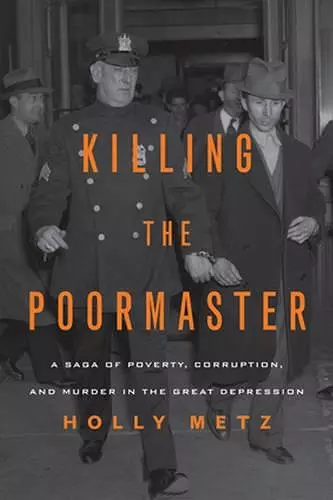Killing the Poormaster
A Saga of Poverty, Corruption, and Murder in the Great Depression
Format:Hardback
Publisher:Chicago Review Press
Published:1st Oct '12
Currently unavailable, our supplier has not provided us a restock date

On February 25, 1938, in the early days of the welfare system, the reviled poormaster Harry Barck--wielding power over who would receive public aid--died from a paper spike thrust into his heart. Barck was murdered, the prosecution would assert, by an unemployed mason named Joe Scutellaro. In denying Scutellaro money, Barck had suggested the man's wife prostitute herself on the streets rather than ask the city of Hoboken, New Jersey, for aid. The men scuffled. Scutellaro insisted that Barck fell on his spike; the police claimed he grabbed the spike and stabbed Barck. News of the poormaster's death brought national attention to the plight of ten million unemployed living in desperate circumstances. A team led by celebrated attorney Samuel Leibowitz of "Scottsboro Boys" fame worked to save Scutellaro from the electric chair, arguing that the jobless man's struggle with the poormaster was a symbol of larger social ills. The trial became an indictment "of a system which expects a man to live, in this great democracy, under such shameful circumstances." We live in a time where the issues examined in Killing the Poormaster --massive unemployment, endemic poverty, and the inadequacy of public assistance--remain vital. With its insight into our social contract, Killing the Poormaster reads like today's news.
"A vivid and illuminating book. By focusing on particular events in the late 1930s Holly Metz manages to reveal the political dynamics of relief and the real tragedies our policy produces." --Frances Fox Piven, author, Regulating the Poor , and Distinguished Professor of Political Science and Sociology at the Graduate Center of the City University of New York
"Holly Metz offers a grim and fascinating glimpse of Americans left to the mercy of petty bureaucrats and party pols once federal relief was withdrawn in the mid-1930s. Gripping history, Killing the Poormaster is also a warning to those who would continue to casually slash assistance programs today. A powerful and compelling book." --Stephen Pimpare, author, A People's History of Poverty in America
"Holly Metz not only opens wide a window on a fascinating epoch in American history, she sheds light on the bitter class enmity that continues to plague us today. Killing the Poormaster is a meticulous and mesmerizing look at our past, the story of one man who struck back at an unfair system and in so doing, ripped the cover off a city's legacy of corruption and injustice." --Anthony DePalma, author, City of Dust and The Man Who Invented Fidel
"Holly Metz vividly reconstructs the social milieu of Depression-era Hoboken, a cauldron of ethnic resentment, passionate loyalties, and profound human suffering, all on display in a murder trial Metz recounts with the flair of a dramatist and the gritty facticity of an investigative reporter." --James T. Fisher, author, On the Irish Waterfront: The Crusader, the Movie, and the Soul of the Port of New York
"Rigorously researched and vividly recounted, this history of the death of a Hoboken Poormaster in the 1930s brings back a time, not unlike today, when a corrupt welfare system made poverty a crime, pushing honest citizens to extremes in their efforts to survive. Move over reality TV, Metz tells a story that rivals your best." --Fred Gardaphe, Distinguished Professor, Queens College/CUNY, and author of From Wiseguys to Wise Men
"This is a well-researched, engrossingly written book which in winning fashion tells a tale that needed to be told, and although unfortunately long overlooked has found a splendid chronicler in Holly Metz." --Daniel J. Leab, Professor of History, Seton Hall University
"[A] well researched book... [Metz] takes what could have been a simple historical true-crime story and grounds it firmly in the era's social history, illustrating the problems faced by the impoverished who relied on relief handouts that were themselves at the whim of a corrupt authority." -- Library Journal
"This well-constructed work of historical nonfiction is heart-wrenching and thoroughly absorbing." -- Booklist
ISBN: 9781613744185
Dimensions: 228mm x 6mm x 152mm
Weight: 610g
320 pages